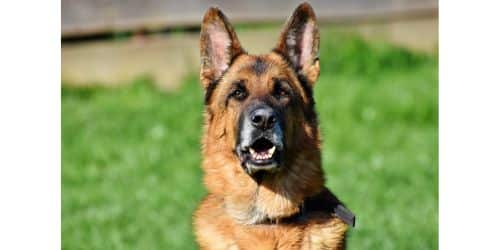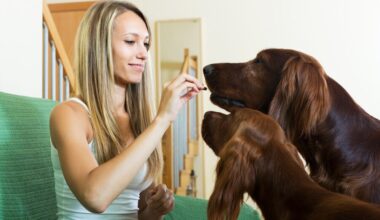Have you ever observed your dog’s teeth chattering and wondered why? Dog teeth chattering might be bewildering for pet owners, but don’t worry! We shall delve into the subject of canine dental chatter in this complete guide. We’ll examine the mysteries of this unique habit, from possible reasons to comprehending the underlying feelings. So, join me on this fascinating adventure to learn the truth about dog teeth chattering.
What is Dog Teeth Chattering?
Dog teeth chattering is the quick clicking or chattering sound made by a dog’s teeth as they vibrate against each other. It may sound similar to human teeth chattering due to chilly weather, but the underlying causes for dogs are frequently different. This behavior can take numerous forms, ranging from faint vibrations to more severe chattering.
Causes of Dog Teeth Chattering
Let us take a look at the following causes:
#1. Normal Physiological Responses
Dog teeth chattering might be a typical physiological response to specific situations in some cases. Exposure to chilly weather is a common reason. Dogs may chatter their teeth to generate heat and control their body temperature. Additionally, dogs’ teeth may chatter during times of intense excitement or anticipation, such as when they are awaiting a treat or playtime.
#2. Dental Issues and Pain
Dental problems and pain can be key causes of dog teeth chattering. Dogs, like people, can suffer from oral discomfort and dental disorders that cause teeth chattering. In this section, we’ll look at how dental disorders can cause teeth chattering in dogs, common dental issues to look out for, and the necessity of managing oral health to relieve pain and discomfort.
Dental disorders such as dental decay, gum disease, and cracked teeth can cause discomfort and sensitivity in dogs, resulting in teeth chattering. Tooth decay, also known as dental caries, is a common disease caused by acids produced by bacteria in the mouth that erode the tooth enamel. As the decay spreads, it might expose the tooth’s sensitive inner layers, causing pain and discomfort. In response to the pain caused by the rotting teeth, dogs with dental caries may exhibit teeth chattering.
Another dental issue that might contribute to teeth chattering in dogs is gum disease, often known as periodontal disease. It happens when plaque and tartar accumulate on the teeth, causing inflammation and infection of the gums. Gum disease can cause gum recession, tooth loss, and deep pockets of infection as it advances. Dogs with advanced gum disease may endure pain and discomfort, which can present as chattering teeth.
Dental pain in dogs can also be caused by fractured or shattered teeth. Trauma, chewing on hard objects, or underlying tooth disease can all cause fractures. The exposed nerves and sensitive tissues of a cracked tooth can cause substantial pain. In response to the pain or discomfort, dogs with shattered teeth may develop teeth chattering.
It should be noted that dogs may not always exhibit clear indicators of tooth pain. They may naturally hide their discomfort, making it difficult for pet owners to identify the underlying problem.
#3. Emotional and Behavioral Factors
Dog behavior, especially teeth chattering, is heavily influenced by emotions. When dogs are frightened, stressed, or afraid, they may chatter their teeth. This conduct could be the result of anxiousness or an attempt to communicate their emotional status. Understanding the emotional triggers that cause teeth chattering can assist you in providing appropriate support and creating a calm atmosphere for your dog.
#4. Anticipation and Excitement
Excessive excitement or anticipation is another major cause of dog teeth chattering. Dogs may exhibit this behavior when they are looking forward to something, such as dinner, a favorite toy, or a walk. It is their method of showing their excitement and eagerness. However, it is critical to distinguish between signals of excitement and signs of anxiety or tension.
#5. Uncomfortable Sensations
Certain physical sensations can also cause dog teeth to clatter. Some dogs, for example, may chatter their teeth when they have nausea or an upset stomach. It could be a reflex reaction to the discomfort they are experiencing. Consult your veterinarian if you experience teeth chattering along with other indicators of gastrointestinal distress to rule out any underlying health issues.
Breeds Prone to Teeth Chattering
While teeth chattering can occur in any type of dog, some breeds are more prone to it. Small breeds, such as Chihuahuas and Yorkshire Terriers, are reported to have more teeth chattering than larger types. Their smaller size and heightened sensitivity to temperature fluctuations are thought to contribute to this tendency. It’s important to realize, however, that individual dogs within a breed can have different characteristics.
Observing Your Dog’s Body Language
It is critical to pay attention to your dog’s general body language to acquire a better understanding of their teeth’ chattering activity. Pay attention to their posture, facial expressions, tail position, and other nonverbal indications. This comprehensive approach can give you significant insights into your dog’s underlying feelings and help you respond appropriately to support.
When to Seek Veterinary Advice
Most of the time, dog teeth chattering is harmless and only momentary. However, there are times when veterinary assistance is required. If your dog’s teeth chattering persists and is accompanied by indicators of pain, discomfort, or behavioral changes, you should see a veterinarian. They can perform a full examination, including a dental evaluation, to establish the underlying reason and, if necessary, offer appropriate therapy.
Tips for Managing Teeth Chattering
While you may not be able to completely prevent teeth chattering, there are several measures you can take to control and support your dog:
- Provide a Comfortable Environment: Make your dog’s environment as quiet and stress-free as possible, minimizing potential triggers that may cause teeth chattering.
- Dental Care: Maintain proper oral hygiene by brushing your dog’s teeth regularly and arranging professional dental cleanings as directed by your veterinarian.
- Temperature Control: Make sure your dog has a warm and comfortable place to rest, especially during the colder months, to reduce teeth chattering caused by temperature.
- Behavior Modification: Consult a competent dog trainer or veterinary behaviorist to design behavior modification tactics and strategies to assist your dog in coping with their emotions if teeth chattering is related to anxiety or fear.
Training and Desensitization Techniques
Training and desensitization strategies might be beneficial for dogs who exhibit teeth chattering as a result of anxiety or fear. You can utilize counter-conditioning methods with a certified dog trainer or behaviorist to help your dog associate happy experiences with the triggers that induce teeth chattering.
Pain Management and Medical Treatment
If your dog’s teeth chattering is caused by dental difficulties or oral discomfort, your veterinarian may offer medication treatment or pain management measures. This can include dental procedures, medication, or other interventions to address the individual dental problem and relieve pain.
Holistic Approaches
In addition to traditional veterinarian care, some dog owners look into holistic ways to help their dog’s overall health. Natural medicines, such as herbal supplements or homeopathic treatments, can be included. However, to ensure the safety and efficacy of such treatments, consult with a veterinarian who is experienced in integrative medicine.
The Importance of Regular Veterinary Check-ups
Regular veterinary check-ups are essential for maintaining your dog’s oral health and well-being. Routine dental examinations can aid in the early detection of dental disorders and the prevention of the advancement of conditions that may contribute to teeth chattering. Your veterinarian can also offer tailored advice and guidance based on your dog’s requirements.
What are the causes of dog teeth chattering?
Dog teeth chattering can be caused by a variety of factors, including:
- Normal Physiological Responses: Dogs’ teeth may chatter in response to chilly conditions. It aids in the generation of heat and the regulation of their body temperature.
- Dental Problems and Pain: Dental issues such as tooth decay, gum disease, or cracked teeth can cause pain and sensitivity, resulting in teeth chattering.
- Emotional and Behavioral Factors: Dogs who are anxious, frightened, or fearful may chatter their teeth. Teeth chattering might be a sign of anxiousness or a technique for them to communicate their emotional state.
- Excitement and Anticipation: When a dog is excited about anything, such as dinner, a favorite toy, or a walk, their teeth may chatter.
- Uncomfortable Sensations: Some dogs may chatter their teeth in response to unpleasant sensations such as nausea or stomach distress.
Is it normal for my dog to chatter its teeth?
Dog teeth chattering might be considered typical behavior in some settings. As previously stated, dogs may chatter their teeth in response to chilly temperatures as a means of producing heat and regulating their body temperature. This is a normal physiological response and should not be taken seriously.
When should I be concerned about my dog’s teeth chattering?
While some teeth chattering in dogs is natural, there are a few cases when you should be worried and seek further treatment from a veterinarian:
- Frequency and Duration: If your dog’s teeth chattering becomes frequent and lasts for an extended amount of time, it could suggest an underlying problem.
- Signs of Discomfort: If your dog shows signs of discomfort in addition to teeth chattering, such as pawing at the mouth, excessive drooling, avoiding food or rewards, or displaying reluctance to chew, this could indicate dental problems or oral pain.
- Changes in Behavior or Appetite: If your dog’s teeth chattering is accompanied by behavioral changes such as increased irritation, aggression, or withdrawal, or if there is a noticeable decrease in appetite or trouble eating, this could indicate an underlying health concern.
- Dental Issues: If your dog has a history of dental difficulties, such as tooth decay, gum disease, or cracked teeth, and you see teeth chattering, it could suggest that the oral discomfort is continuing or worsening.
- Other Symptoms: If teeth chattering is accompanied by other troubling symptoms such as foul breath, swollen gums, bleeding from the mouth, weight loss, or changes in bathroom habits, it is critical to get veterinary treatment as soon as possible, since these can be indicators of more serious underlying illnesses.
How can I help my dog stop chattering its teeth?
If your dog’s teeth are chattering and it is not caused by a medical ailment, there are a few things you can try to help reduce the behavior:
- Provide Warmth: If your dog’s teeth chattering is caused by cold temperatures, make sure they are in a warm and comfortable environment. To keep them warm, provide blankets or a heated dog bed.
- Manage Anxiety and Stress: If your teeth chattering is caused by anxiety or stress, you should identify and address the underlying causes. Create a quiet and secure atmosphere for your dog, and consider employing strategies such as desensitization or counter-conditioning to assist in easing anxiety.
- Regular Exercise and Mental Stimulation: To assist in alleviating tension and anxiety, engage your dog in regular exercise and mental stimulation activities. Physical activity and mental stimulation can improve general well-being and help reduce habits such as teeth chattering.
- Consult a specialist: If your dog’s teeth chattering persists or is causing suffering, it is best to seek the advice of a specialist, such as a veterinarian or a trained animal behaviorist.
Conclusion
Dog teeth chattering can be perplexing for dog owners, but understanding its potential origins and underlying emotions will help you better assist your canine companion. Whether it’s a physiological response, a dental issue, or an emotional trigger, paying attention to your dog’s teeth chattering and receiving proper veterinary care as needed is critical. You may enhance your dog’s well-being and strengthen your bond by providing a pleasant environment, treating oral health, and regulating your dog’s emotions.
Finally, dog teeth chattering is a multifaceted activity that can be caused by a variety of factors. Consider the context, examine your dog’s body language, and seek veterinary guidance if needed. You can negotiate the world of dog teeth chattering and ensure your canine companion lives a happy and healthy life with patience, understanding, and adequate care.
Related Articles
- CAT TEETH CLEANING COST: Everything You Need
- Dog Braces For Teeth: All You Need To Know
- DOG MOUTH CANCER LIFE EXPECTANCY: Early Symptoms and Treatment
- ARE SHIH TZUS HYPOALLERGENIC?
- Bladder Cancer In Dogs: Causes, Symptoms, and Treatment






